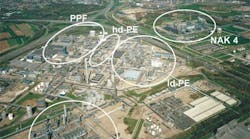Brazilian antitrust authorities have launched an investigation of activity by state petroleum firm Petroleo Brasileiro SA in Brazil's natural gas sector.
Until 1997, when new legislation ended the state firm's 43-year-old monopoly over the nation's petroleum sector, no antitrust issues would have arisen.
Investigation
The Administrative Council for the Defense of the Economy (CADE), the antitrust regulatory board of the Brazilian Treasury, and the National Petroleum Agency (ANP) are investigating all Petrobras actions related to the natural gas market.These agencies allege that Petrobras is interfering with the competitiveness of Brazil's gas sector, with regard to imports, transportation, and distribution of natural gas in the country.
Petrobras is expected to have its market actions limited, particularly by being forced to sell some of its participating interests in the state gas companies, Jean-Paul Prates, executive-director of Expetro International, a prominent Brazilian consulting firm specialized in oil and natural gas, told OGJ.
Petrobras, through its subsidiary BR Distribuidora, is an equity partner in most state gas distribution companies all over Brazil and is the top distributor of refined products, anhydrous ethanol (used in motor fuel), and natural gas.
Brazilian natural gas consumption is on the rise, according to the latest Petrobras data. It estimates gas consumption jumped to 16.6 million cu m in January this year from 15.8 million cu m in January 1998, an increase of 5.06%.
Petrobras also hopes to exploit cogeneration opportunities in the rapidly growing electricity sector, rendering technological assistance to developers in setting up cogeneration projects to provide electricity and process heat. Prospects have been identified for projects with capacities of 1-50 MW each for a number of customers around Brazil.
Gas distribution issues
According to Prates, since 1990, Brazil's state governments have created their own local natural gas distribution companies, entering into partnerships with Bahia state-based private group OAS and BR Distribuidora.This initiative is based upon an amendment to Brazil's constitution, passed in 1988, which grants the states of the federation the exclusive right to authorize and award concessions for distribution of natural gas at local levels.
Recently, Enron Corp. bought the OAS share from several states, and most of the state governments granted exclusive concessions for many years to these private companies.
"This created concern about the efficiency and the economic sense of the constitutional provision supporting the state government's move, considering that certain state governors started alleging that their 'monopoly' would be extendable to natural gas transportation within each state, and (they) tried to push for the definition of city gate (for pricing purposes) according to their expansion targets," said Prates.
ANP is viewed by natural gas specialists as the sole entity with authority to determine the actual city gate locations, as well as to decide on the nature of transportation and distribution activity. "Hopefully, ANP will use technical and economic criteria, rather than merely the geographical ones, which would basically favor the larger states to the detriment of the overall interests of the industry and the consumers," said Prates.
Regarding Petrobras' participation in the state companies, Prates believes that ANP may follow a process similar to the one adopted by the National Electricity Agency, meaning that Petrobras would have to give up its participation either at the beginning or at the end of the natural gas value chain.
Prates is betting that Petrobras is more likely to limit its participation at the distribution end.
Copyright 1999 Oil & Gas Journal. All Rights Reserved.

